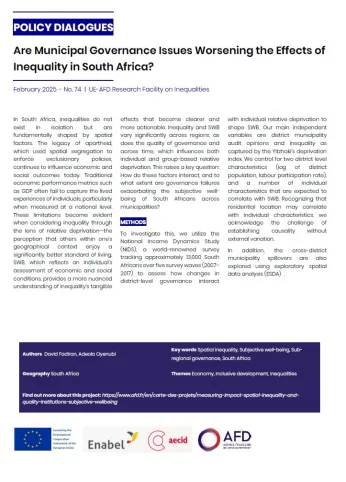Share the page
Are Municipal Governance Issues Worsening the Effects of Inequality in South Africa?
Published on

In South Africa, inequalities do not exist in isolation but are fundamentally shaped by spatial factors. The legacy of apartheid, which used spatial segregation to enforce exclusionary policies, continues to influence economic and social outcomes today. Traditional economic performance metrics such as GDP often fail to capture the lived experiences of individuals, particularly when measured at a national level. These limitations become evident when considering inequality through the lens of relative deprivation the perception that others within one’s geographical context enjoy a significantly better standard of living. SWB, which reflects an individual’s assessment of economic and social conditions, provides a more nuanced understanding of inequality’s tangible effects that become clearer and more actionable. Inequality and SWB vary significantly across regions, as does the quality of governance and across time, which influences both individual and group-based relative deprivation. This raises a key question: How do these factors interact, and to what extent are governance failures exacerbating the subjective wellbeing of South Africans across municipalities?
Useful Information
-
Authors
-
David Fadiran, Adeola Oyenubi
-
Edition
-
74
-
Number of pages
-
2
-
Collection
-
Policy Dialogues
-
Languages
-
english
